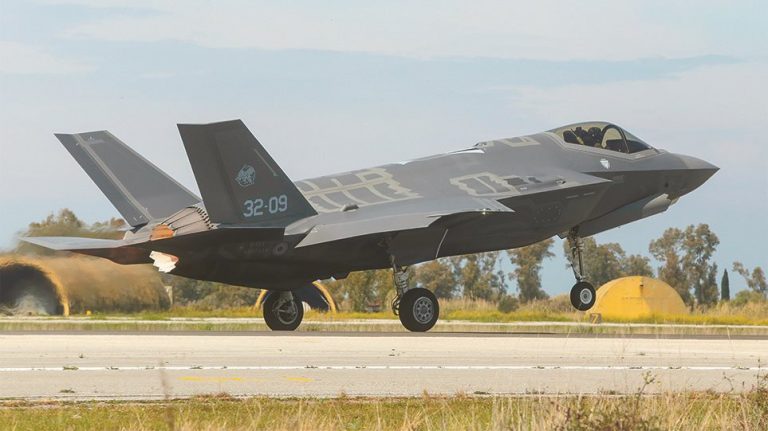Turkey’s continuing belligerent stance in the eastern Mediterranean region and its expansionist policies have resulted in Greece responding by planning to boost its military deterrence in an effort to restore the balance of power in the air and the sea and mitigate the ongoing threat posed by its NATO “ally”.
A struggling and battered Greek economy does not allow for a new arms race with Turkey, which means that acquiring new weapons demands the utmost consideration so that the cost-benefit ratio is the best possible, the weapons are operational as soon as possible, and their effectiveness to defend the country can last for the next two decades.
According to the plans and the current time frame, the estimated €15 billion to be disbursed over the next decade will be spent on three key projects: the safe acquisition of 18 French Rafale fighter jets, the purchase of four frigates, and the planned purchase of 18-24 US F-35 fighter jets.
The plan to supply a squadron of US Stealth fighters, however, is contingent on whether it can be implemented immediately, even in 2021, given the limits set by the State General Accounting Office for a deal expected to reach 3.5 -4 billion considering Washington’s, almost certain demand for advance repayment of the program.
With the imminent acquisition of a squadron of 18-24 fifth-generation F-35 fighters, along with the purchase of 18 Rafale, Greece will not only achieve a balance of power with Turkey in the air but could even get the upper hand. However, if the agreement on the acquisition of F-35 is not concluded now, Turkey will retain the upper hand, as a possible turn of Recep Tayyip Erdogan to the United States could bring Turkey back into the F-35 program. This prospect would inevitably leave Greece scrambling to catch up to the new status quo.
According to the current time frame, the signing of the purchase agreement for the French Rafale fighter aircraft is scheduled for December. Immediately after the formalisation of the contract, the first four Greek pilots of the Hellenic Air Force (HAF) who will be trained in Rafale by the French Air Force and executives of the construction company Dassault will leave for France.
also read
Russian destroyer stops US warship in Russian waters, defence Ministry says
Greece provides 50% tax deductions to foreigners and Greeks abroad
Of the 18 Rafale, the 12 will be slightly used and the remaining 6 new. 6 of the 12 used twin-engine French fighter jets are scheduled to be delivered to the Hellenic Air Force in the early summer of 2021. It has been agreed that these are 6 Rafale F3Rs, which will arrive in Greece with full weapons, the Meteor and Exocet missiles, while the HAF Rafale will be able to carry both the Mica air-to-air missiles and the strategic Scalp missile weapon, which is already in its arsenal and will be certified directly by the French manufacturers to extend their operational life. The purchase of the 18 French Rafale is expected to cost 2.4 billion euros (about 2 billion for twin-engine fighters and another 400 million euros for their weapons).
Things are different on the seafront, as experts have expressed their concerns over the decision to opt for the outdated and widely considered failed MMSC frigates over the French Belharra-class frigates.
“The Navy will say ‘Yes’ to whatever frigate you tell it to acquire because it is using 1980 frigates,” a retired officer told THEMA. The decision to build four MMSC frigates, at a budget cost of 4 billion euros, including a package with the so-called “transitional solution” of frigates for the period of 7-8 years until the construction of new frigates has caused grumbling in the Navy.
Many point out that without a tender it was decided to acquire the Multi-Mission Surface Combatant (MMSC) platform based on the US Navy ship “LCS Freedom”. The LCS platform is considered an almost failed program. Initially, 355 (!) Ships were planned to be built in the following decades, but the program was cancelled in 2014 and only 16 ships were built.
In the last 24 hours, due to the realisation by the Ministry of National Defence that the ships offered as an intermediate solution are obsolete, an attempt is made to bring the American frigates, Arleigh Burke, back into the discussion, which are an ardent desire of the Navy combat officers.
The issue is whether a comparative evaluation of the American proposal has been made with the corresponding French one for the Belharra-class frigates.
Ask me anything
Explore related questions





